Simple Ways We Can Stop Throwing Our Food Dollars Into The Garbage
I’m having a difficult time wrapping my head around this documented fact: Nearly half of all produce grown in the U.S. is thrown out, while at the same time there is growing hunger and poverty right here in America.
As I read the first paragraph of this news story, I assumed naively that all U.S.-grown produce makes it to market. Then consumers like you and I get it home, let it go bad before we can consume it and into the garbage it goes. That is a factor, but not the whole story.
The truth is that vast quantities of fresh produce are left in fields and orchards to rot. It then becomes livestock feed or gets hauled directly to the landfill because of cosmetic standards.
Not every potato, watermelon, strawberry, or grape cluster turns out photo-perfect. Some are ugly. And, unfortunately, that means they do not meet retailer and consumer demands for blemish-free, perfect produce.
Just imagine how the retail cost of produce might plummet if all that is grown—even the still-nutritious but ugly produce—were available for sale.
Starts at Home
I don’t know of anything we can do individually about this matter of retail waste, but I know we can stop the carnage in our homes.
According to Pennsylvania State University research, the average U.S. household of four people throws out one-third of the food it buys, costing that average household $1,866 of its food budget in rotten food every year. Wow. That makes my head spin! Even if that number is far less in your home, consider these simple ways all of us can stop throwing any of our food dollars into the garbage.
Don’t Overbuy
The way to do this is to have a good, realistic plan for the produce you bring into your house. Make certain you will consume it before it goes bad—regardless of the great sale price or how beautiful it looks in the store or farmer’s market.
Simply buying too much is the number one reason that household produce lands in the garbage.
Disinfect the Fridge
I plead guilty on this one. I just don’t think about it if I can’t see a mess. The truth is that anytime something spoils in the refrigerator, it leaves behind mold we can’t see. As a result, this mold attacks the new fresh stuff you put in there. Disinfecting the inside surfaces of your refrigerator on a regular schedule will make everything last a little longer and smell a lot better.
BluApple
This highly rated clever gadget slows down the ripening process by absorbing the natural ethylene gas, which all fruits and vegetables give off in the process of ripening. Ethylene is a harmless, odorless, and colorless gas responsible for the natural ripening process. A high concentration of ethylene gas in the refrigerator or the fruit bowl speeds up the ripening process and that’s what hastens spoilage.
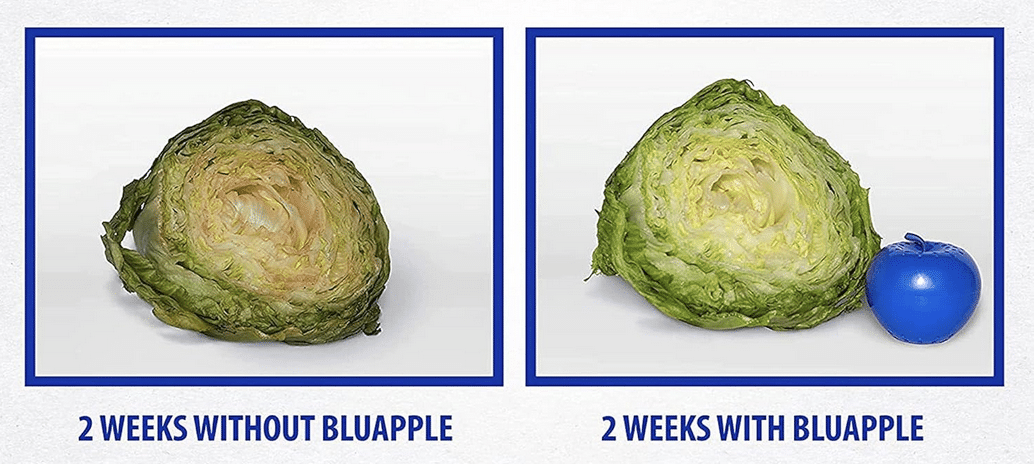
The only trick is in remembering to replace the ethylene absorption packets every few months to ensure that your BluApple is working at peak efficiency.
BluApple works really well—amazingly, in fact. If you’re interested, I recommend starting with the BluApple One-Year Combo Pack, which includes two BluApples (one for the fruit bowl, one for the refrigerator) and six ethylene absorbing packets, which is what you need for one full year of BluApple usefulness.
Vacuum Seal
A vacuum-sealing machine is the best option for extending the useful life of produce. Food can be vacuum-sealed in bags or specific canisters. My favorite method for storing everything from strawberries to tomatoes is in ordinary glass canning jars.
This requires either a standalone Jar Sealing Kit or an attachment for a vacuum sealing machine the Foodsaver.
Simply fill a glass canning jar (regular or wide-mouth) with unwashed produce like strawberries, blueberries, tomatoes, lettuce, etc. Set the lid on the jar and apply the jar sealer. Start the machine and it removes all of the air from the jar and seals the jar tightly.
Stored in the refrigerator, the contents will remain fresh and beautiful for weeks, not days, depending on the specific item.
This standalone Mason jar vacuum sealing gadget is fantastic! Works for both standard and wide-mouth jars. Comes with a few rings and lids for both sizes. Cordless, rechargeable.
Budget option
While this is a very handy, compact vacuum sealing machine, it does not offer a jar sealing component or add-on attachment.
- READ POST: Other ways to use a vacuum sealer
Ugly Produce
There is a lovely company, Misfits Market, that offers a subscription delivery service for “ugly” food. The New Jersey based company estimates that about one-fifth of all fruit and vegetables end up in the dump for failure to conform to the industry standard of perfection. Misfits Market offers perfectly healthy and nutritious “ugly” produce for up to 40% less than retail store prices.
At this time, Misfits Market delivers to all 48 continental US states—coming soon to Alaska, Hawaii and Puerto Rico.
About Misfits Market
Misfits Market delivers organic produce and specialty groceries directly to your door for up to 40% less than grocery store prices.
In addition to saving you money, Misfits Market helps reduce food waste and provides access to fruits and vegetables that may not be available at your local supermarket.
While Misfits Market once operated as a subscription-based produce delivery service, the company has since expanded, offering a wide variety of grocery items that can be purchased without the need for a membership or recurring order.
Grow Your Own
Now more than ever, it’s important that we think about and made necessary plans to grow our own food. There was nothing like a worldwide pandemic, long lines at food stores plus talk and fear of food shortages to wake us up to the idea of becoming more self-reliant.
You don’t need acreage to grow a garden. In fact, you don’t even need yard or plot of land (although that is surely a blessing if you do).
Start reading, start learning, start a garden!
Everyday Cheapskate participates in the Amazon Services LLC Associates Program and other affiliate advertising programs designed to provide a means for us to earn fees by linking to Amazon affiliated sites. If you click on a link above and go on to make a purchase, we will earn a small comission that goes to keep this site free to all.
More from Everyday Cheapskate
Please keep your comments positive, encouraging, helpful, brief,
and on-topic in keeping with EC Commenting Guidelines
Last update on 2024-04-19 / Affiliate links / Images from Amazon Product Advertising API

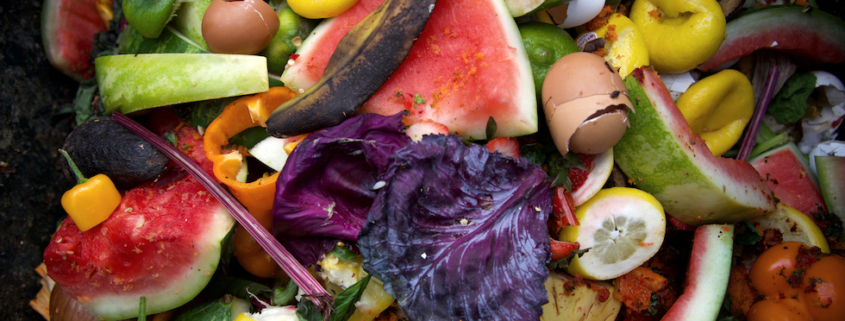



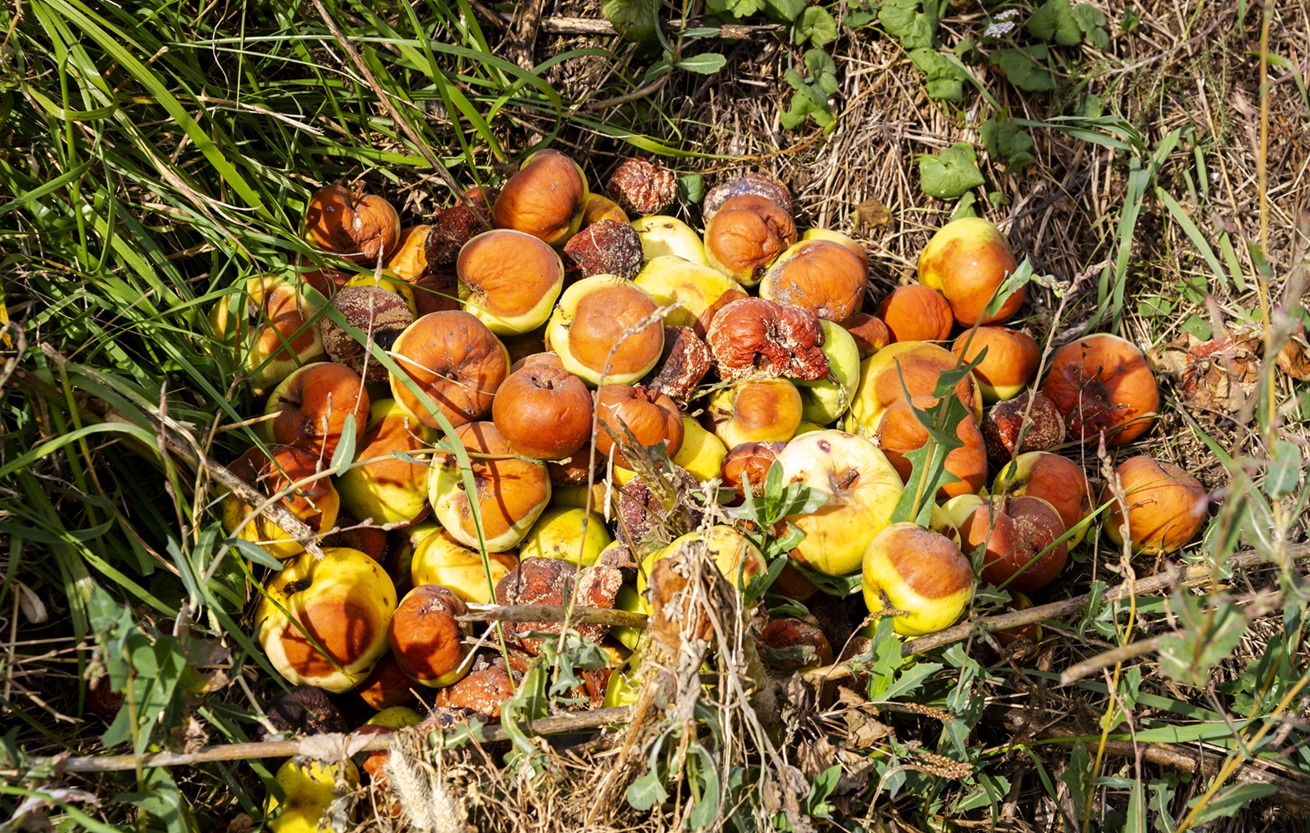






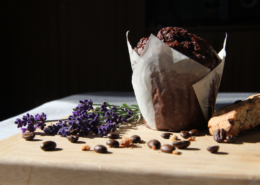
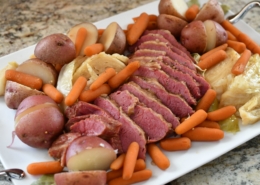

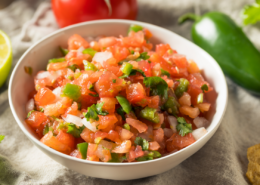
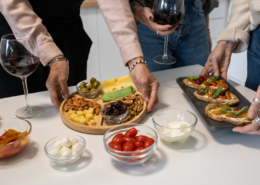
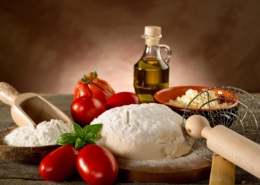
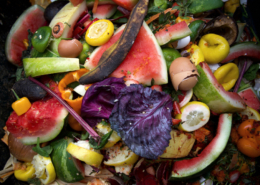
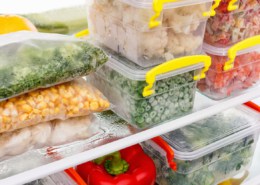



Keep in mind that throwing out or composting some food that goes bad still costs less than eating out. We bought a head of lettuce, some tomatoes, and an onion when we grilled hamburgers. The burgers were delicious, but most of the lettuce wasn’t used. Composting that lettuce cost a lot less than buying burgers at a fast food place, and not having any wasted food.
I use Blueapple. But If I put a bag of Avocados in a drawer, How many blueapples do I need to put in it?
Their by themselfs.
Also, I have a foodsavor for bags and one of the one like what you showed for jars, Mason jar vacuum sealing machine. (then I don’t have to lug the machine for jars. lol.)
and I try to use up my food before they go bad. If my meal has been 3 day then I freeze it for a lunch.
I like to bag up beans and flour, oakmeal and other things with my foodsaver machine. I don’t have much room for bottles because I live in a apt.
I also compost bad produce and tolet paper rolls for dirt in the spring. Great stuff!
IF (and that’s a big IF, because it likely is stuff like trimmed-off bad spots and corn cobs and the like) any produce goes bad in our house, it goes to the compost. Since we have a lovely, big garden, we use the compost to fertilize and top-dress the garden, and dig it in generously in the spring during planting season.
What goes in makes great vegetables and small fruits as well as beautiful flowers. It can all be done in a smaller situation too — plants can be grown in pots, tubs and bins, not just in standard garden rows. There are even indoor composting containers that makes it all simple.